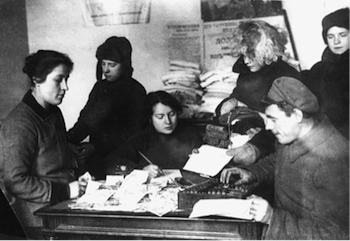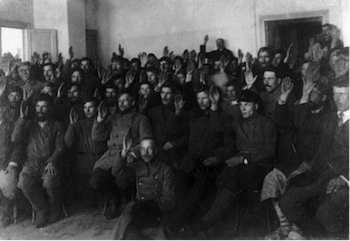

|
A Dictatorship of the Bureaucracy  Soviet office  Voting at a Party meeting Not surprisingly for a party-state that aimed to control the whole of society, the Soviet bureaucracy ballooned spectacularly during the civil war. By 1920, 5.4 million people worked for the party-state. There were twice as many government officials as workers. They were the social base of the regime. This was not a Dictatorship of the Proletariat but a Dictatorship of the Bureaucracy. Joining the party was the surest way to gain promotion. From 1917 to 1920, 1.4 million people joined the Bolsheviks. Nearly all of them were from lower-class and peasant backgrounds, and many joined the party through the Red Army, which taught millions of peasant conscripts how to think like Bolsheviks. The Soviets were transformed from local revolutionary bodies controlled by an assembly to bureaucratic organs of the party-state where all real power lay with the Bolsheviks who dominated the executives. In many Soviets, especially in areas deemed important in the civil war, the executives were not elected at all: the Central Committee in Moscow simply sent in commissars to run the Soviets. In the lower rural Soviets the executives were elected. Here the Bolshevik success was partly due to the open system of voting and intimidation of voters. But it was also due to the support of the younger and more literate peasants who had left the village in the First World War and returned in the civil war newly skilled in military techniques and organization and well versed in the ideas of the revolution. EXTRACT FOR SUBSCRIBERS ONLY. Orlando Figes, Peasant Russia, Civil War: The Volga Countryside in Revolution, 1917-1921 (Oxford, 1989). Most of the new rural Soviet leaders - whether Bolsheviks or not - originated from the smallholding peasantry. The crucial point, however, is that they were not the sort of peasants who had previously dominated village politics... [FULL TEXT 291 WORDS] |
© 2014 Orlando Figes | All Rights Reserved